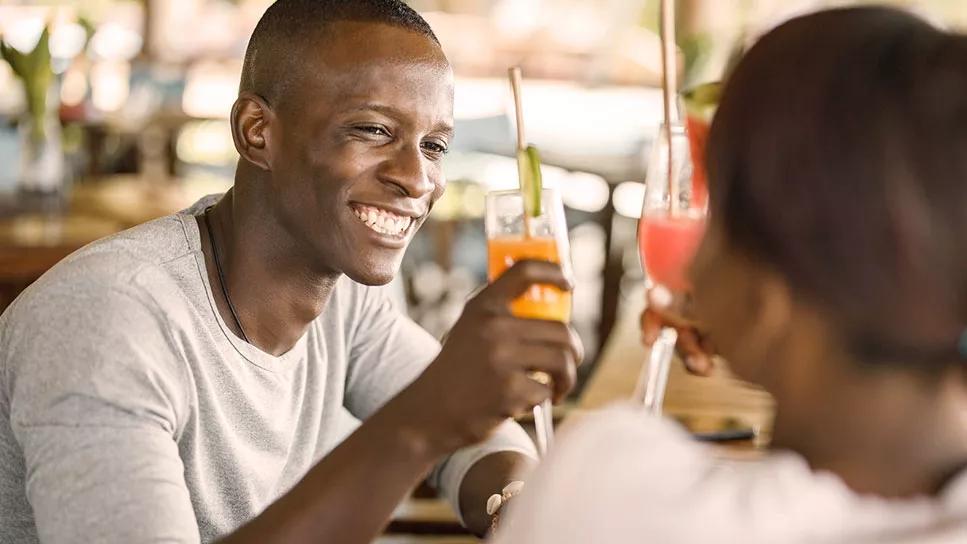Drinking during the day can result in drinking more than usual and worsen your sleep cycle

Image content: This image is available to view online.
View image online (https://assets.clevelandclinic.org/transform/3998b430-ea01-4df3-bb0e-461593fb211f/couple-drinking-bar-1679784930)
Couple enjoying mixed drinks during the day in a bar
When you think of grabbing a drink, you probably envision a low-lit bar or a late-night dinner. But have you ever tried (or been invited) to day drink? If so, you may have noticed that something about it makes you feel … a bit off.
Advertisement
Cleveland Clinic is a non-profit academic medical center. Advertising on our site helps support our mission. We do not endorse non-Cleveland Clinic products or services. Policy
Whether it’s the early-evening hangover or your body simply not being used to a midday buzz, you may feel some differences in how you react to alcohol during earlier parts of the day.
Addiction psychiatrist Akhil Anand, MD, breaks down why day drinking can feel different — and how it can impact your health.
Day drinking can sometimes be a part of social gatherings. Whether it’s a Fourth of July barbecue, grabbing a beer at the St. Patrick’s Day parade or tailgating with friends before the big football game, it’s clear that alcohol isn’t always reserved for after-hours.
But as Dr. Anand points out, there are certain risks to drinking during the day. Here are some things to know before toasting before 5 p.m.
While drinking in the evening usually has a “natural” end, day drinking leaves it open-ended. This increases the risk of overdoing it. Dr. Anand says that if you start drinking earlier in the day, it’s more likely you’ll drink more. You may also feel more peer pressure when participating in day drinking if it’s associated with a celebration of some kind.
You may think that drinking earlier may give your body time to filter through the alcohol before your head hits the pillow. But in fact, day drinking can do just as much harm to your sleep schedule as drinking in the evening.
Advertisement
Drinking during the day can disrupt sleep cycles due to how your circadian rhythm works. “Your sleep cycle follows the sun pattern of the day,” explains Dr. Anand. “Day drinking can cause someone to feel sedated and go to sleep too early.” This can cause sleep disruptions in the middle of the night, causing you to wake up either too early or too late. And so the cycle continues.
You may have heard that drinking can cause your anxiety to increase the day after. Day drinking can cause the same symptoms, but instead of hitting you the morning after, the anxious feelings may start the same day.
Plus, as alcohol is a depressant, it’ll bring you down as intensely as it will bring you up. Also, don’t think that you’ll feel more energetic during the day versus drinking at night — you’ll still feel just as drunk no matter what time it is.
Don’t forget that there are other factors impacting your well-being while you drink. Especially if the sun is beating down during an outdoor event, your body is at a higher risk for dehydration when you drink during the day.
Having a mimosa with brunch is one thing, but as Dr. Anand explains, you should be careful when it comes to any kind of alcoholic beverage first thing in the morning. Once in a while is fine, but if you start needing a drink as soon as you start the day, it may be a sign of addiction.
And if you find that your day drinking is inching earlier and earlier into the day and if it’s becoming a common occurrence instead of an occasional celebration, you may want to consult a healthcare provider.
If you do decide to partake in a drink or two during daytime celebrations, it’s still important to stay safe and be mindful of your health.
Here are some safe drinking habits to practice:
Advertisement
Remember that you should never feel pressured to drink during the day if you don’t want to. Depending on your own health, preferences and comfort level, you might decide to forgo that glass of wine or beer with friends if it feels too early for you, which is totally OK! In fact, there are a variety of nonalcoholic options you can enjoy while still celebrating a daytime event. These are also great options to turn to after you’ve had a drink or two, to help ensure you don’t overdo it when the festivities continue.
Advertisement

Sign up for our Health Essentials emails for expert guidance on nutrition, fitness, sleep, skin care and more.
Learn more about our editorial process.
Advertisement
Alcohol affects your whole body, from your liver and immune system to your brain and mental health
Set a date, avoid triggers, and get help and support along the way
Where you need to draw the line
There are many health advantages to quitting alcohol
But no level of alcohol is safe for moms-to-be
But many may not realize they're at risk
Misleading claims, lack of scientific evidence and the risk of over-doing it are all concerns
Getting rid of excess abdominal fat will take more than just cutting back on cold ones
Type 2 diabetes isn’t inevitable with these dietary changes
Applying a hot or cold compress can help with pain
Pump up your iron intake with foods like tuna, tofu and turkey